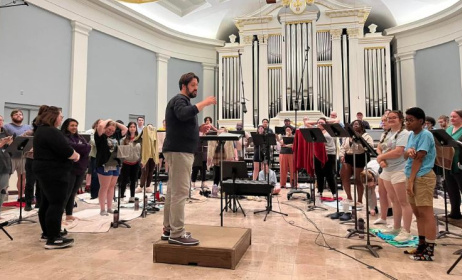Call for compositions: Society for Music Theory Podcast
The Society for Music Theory (SMT) in the US is calling on composers around the world to submit compositions for its Society for Music Theory Podcast (SMT-Pod).
 The submission deadline is 31 July. Photo: Nadine Photography
The submission deadline is 31 July. Photo: Nadine Photography
Interested composers should submit short compositions of music for the podcast’s theme and transitional bumpers. The episodes of SMT-Pod will be regularly heard by SMT’s 1 000-plus membership, with listenership extending into the composition, performance and music pedagogy communities. A composer will be verbally credited by name on every SMT-Pod episode on which the composer’s music is used.
Interested composers should submit their compositions here.
The submission deadline is 31 July and successful composers will be notified on 31 August.
Eligibility
- The call is open to composers of all ages, genres/styles, countries of residence and career stages.
- Female composers, underrepresented gender expression or sexual orientation, underrepresented ethnic or racial communities, neurodivergent persons or persons with a disability, and/or any underrepresented communities are encouraged to apply.
Application details
- Submissions for the theme music should be 15 to 30 seconds in duration.
- Submissions for the transitional bumpers should be five to 10 seconds in duration. The SMT-Pod committee may select an excerpt of a theme music submission for the bumpers.
- The primary difference between theme music and transitional bumper music is that the theme music will be played at the beginning of every episode, while bumpers will be used to transition between segments of the podcast. One theme music submission will be selected as winner (though the SMT-Pod committee reserves the right to select multiple submissions to be used in rotation). From the transitional bumper submissions, multiple selections will be used in rotation across various episodes, reflecting the diversity of music making in today’s world.
- Submissions may be audio excerpts of larger works (composers must trim the audio file to the desired excerpt prior to submission). If so, the audio file should either begin and end at a natural-sounding point or fade in and/or out in an appropriate manner for a podcast. If a score is provided, composers should mark the score to indicate where the audio excerpt begins and ends. In the PDF, composers should include only the score’s frontmatter and pages including the audio excerpt.
- Composers may submit a maximum of one submission for theme music and two submissions for transitional bumper music.
- Submissions for the transitional bumper music do not necessarily need to pair together as a single opening/closing bumper pair. However, if composers intend for their submissions to be paired together as the opening and closing bumpers for a segment (such as if they are excerpts of the same composition), they may indicate that in the comments.
- Composers should upload audio and score files to a file-sharing service such as Google Drive and provide the sharing links in the application form. They should ensure that there is no expiration date on the shared folder and that anyone with the shared link can download the file. It is the composer’s responsibility to make sure file-sharing availability is maintained.
- Before submitting, composers should make sure that there are no copyright issues with the audio they are proposing. Audio files may not have record label claims on them such that the recording’s use in the SMT-Pod requires royalty payments to a label. Pieces may not contain use of a sample that would be subject to a copyright claim.
Read more here.
“We welcome submissions from composers in genres and styles not traditionally conceived as ‘classical’ or ‘concert’ music, as well as those that are,” SMT says. “Submit the music that best expresses your artistic voice and would work well in a podcast context.”
View the original call here.



































Comments
Log in or register to post comments